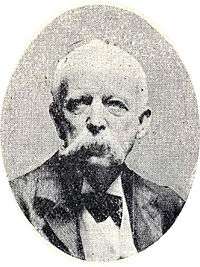Thomas Holdich
Colonel Sir Thomas Hungerford Holdich KCMG KCIE CB FRGS (13 February 1843 – 2 November 1929) was an English geographer and president of the Royal Geographical Society. He is best known as Superintendent of Frontier Surveys in British India and author of numerous books, including The Gates of India, The Countries of the King's Award and Political Frontiers and Boundary Making.[1]

Born in Dingley, Northamptonshire, England to the Rev. Thomas Peach Holdich, he was educated at Godolphin Grammar School and the Royal Military Academy, obtaining a commission in the Royal Engineers in 1862. He saw active service in the Bhutan expedition of 1865, the Abyssinian campaign of 1867-68 and the Second Afghan War of 1878–79.
During peacetime, he was largely occupied with the survey of India, and served on the Afghan Boundary Commission of 1884–86, the Tasmar Boundary Commission of 1894, the Pamir Boundary Commission of 1895 and the Perso-Baluchistan Boundary Commission of 1896. He was also engaged in The Cordillera of the Andes Boundary Case by the governments of Argentina and Chile in 1902 to define the boundary along the Andes Mountains. He was awarded the Founder's Gold Medal of the Royal Geographical Society in 1887 in recognition of his work on the Afghan frontier.
On his retirement to half-pay in 1898, he thanked "that providence which had been good to me in that during that last year of my Indian career I had been able to put a round finish on the last of our frontier maps". He was placed on the Retired list with an Indian pension 13 February 1900.[2]
In later years, he wrote and lectured extensively on geographical issues, and served as president of the Royal Geographical Society from 1917–19. He also served as President of the Geographical Association between 1917–18. He contributed a number of entries to the eleventh edition of the Encyclopædia Britannica.
Boundaries are the inevitable product of advancing civilisation; they are human inventions not necessarily supported by nature's dispositions, and as such they are only of solid value so long as they can be made strong enough and secure enough to prevent their violation and infringement. - Sir Thomas Hungerford Holdich (1916)[3]
Sir Thomas was married to Ada Vanrenen, and had two daughters and two sons. He died in 1929 at his home at Parklands in Merrow, Surrey, near Guildford, at the age of 86.
List of publications
- T H Holdich. (Editor). Peru-Bolivia Boundary Commission Report 1911-1913. 1918.
- T H Holdich. Boundaries in Europe and the Near East, 1918.
- T H Holdich. Frontiers and Boundary Making, 1916.
- T H Holdich, Leonard Arthur Bethell and Hamilton Bower. The Abor Expedition: Geographical Results: Discussion. Geographical Journal, Feb., 1913, vol. 41, no. 2, pages 109–114.
- T H Holdich. Gates of India, Being an Historical Narrative of Early Relations Between the East and the West, 1910.
- T H Holdich. Tibet the Mysterious, 1906.
- T H Holdich. Countries of the King's Award, 1904.
- T H Holdich. England's Strength in Asia. Proceedings of the Central Asian Society, 1904.
- T H Holdich. Indian Borderland 1880-1900, 1901.
- M. G. Gerard, T. H. Holdrich, R. A. Wahab, A. W. Alcock. Report on the proceedings of the Pamir Boundary Commission. Calcutta: Office of the Superintendent of Government Printing, India. 1897.
- T H Holdich. Notes on the Antiquities, Ethnography and History of Las Bela and Makran, 1894.
- . The Empire and the century. London: John Murray. 1905. pp. 651–662.CS1 maint: ref=harv (link)
References
- "Obituary: Sir Thomas Holdich – A Maker of Frontiers". The Times. The Times Digital Archive. 4 November 1929. p. 14.
- "No. 27167". The London Gazette. 20 February 1900. p. 1173.
- Political Frontiers and Boundary Making (London:Macmillan and Co., 1916 p.2.
External links
| Wikisource has original works written by or about: Thomas Holdich |
- Biography from the Holdich Family History Society
- The Geographical Journal - Obituary, Vol LXXV, No 3, March 1930
- Works by Thomas Holdich at Project Gutenberg
- Works by or about Thomas Holdich at Internet Archive
